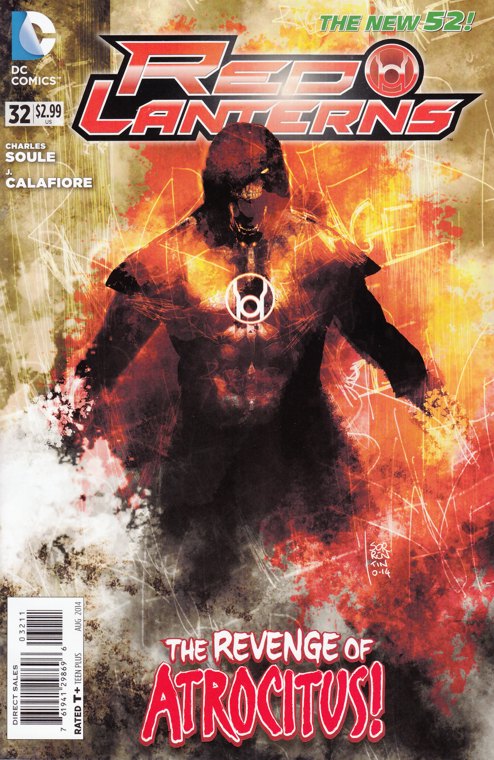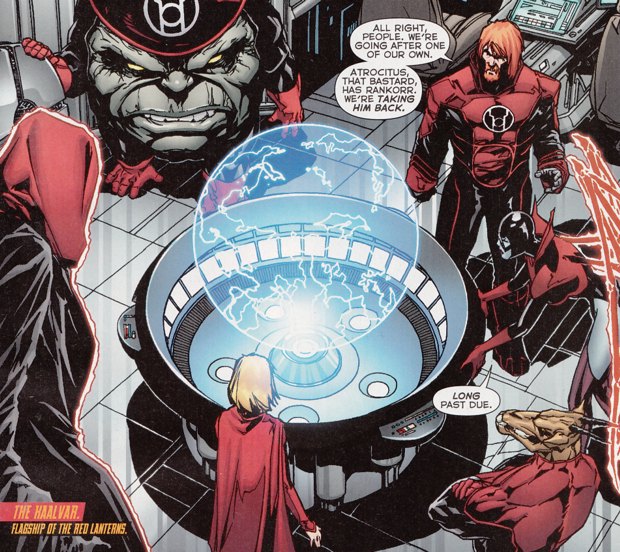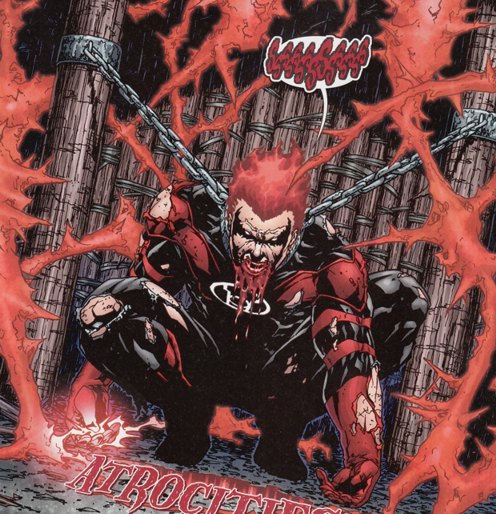
Since the new Sandman keeps not being for sale every Wednesday, this cover is as close as we're going to get to the next issue.
The other big thing that happened was Supergirl was sent packing because Guy Gardner didn't want to see her hurt and believes she doesn't deserve to be saddled with the Lantern curse. He probably sees a bit of himself in her. Young and angry with a fuck ton of potential and plenty of years to make something of herself. He let his anger choose the course of his destiny and he doesn't want to see that happen to her as well. I know Guy thinks of himself as a hero but he also seems to believe he deserves his place on the Red Lanterns. I'm pretty sure it stems from his Daddy Issues.

Here's a picture because comic books use pictures. A lot!
So now that the comic book part of this session is over, you can go. Or you can stay and read another project I never finished. It was mostly to help me get a grip on Samuel Beckett's Murphy but it was also at a time when I was writing children's versions of modern literature novels. Why should adults be the only ones to learn that society is a ruthless, awful place that grinds down an individual until they can barely function anymore? They should learn that before they go through schooling, not after! Most of the books I was writing were meant for children who have had a year or two of reading under their belt. Get them the truth as soon as possible, I say! This version of Murphy was for older kids up to about sixty or so. And I only managed to get halfway through Murphy before it stalled (halfway on this read. I think I'd read it twice before I began this project). I also imagined grainy, unfinished pencil sketches of each of the characters as they were introduced.
Murphy
By Samuel Beckett
Interpreted by Grunion Guy
There was a man named Murphy who didn't quite fit in. Or more precisely, he couldn't quite fit in. Or closer to the truth, he just wouldn't quite fit in.By Samuel Beckett
Interpreted by Grunion Guy
There was also a man named Neary who couldn't teach Murphy to love in the unrequited way that Neary loved the woman who loved a man who loved a woman who loved a man who loved a woman who loved Neary.
There was a woman named Celia who couldn't quite make it work with Murphy. At least she couldn't get Murphy to work so that their relationship could. And the kind of work that Celia did worked completely against the bounds of a relationship.
The problem, thought Celia, was that Murphy wouldn't work. Work would keep them bound. The problem, thought Murphy, was that he had tried to work and it didn't. Work would be their undoing.
But Murphy allowed for one more chance at work, for Celia had become common in his life and he felt he should make a minimal effort to keep her around. He'd trust his fate to the stars except he didn't have the money even for a reading. Celia would just have to be happy with his thinking about an attempt at finding work.
Celia wasn't. So Celia and Murphy parted because she wanted him to be other than he was and he wanted her to love just what she saw. Murphy also didn't seem to be bothered one way or the other if Celia stayed or she went.
There was an old man named Kelly who dreamt of flying a kite. He advised Celia to be rid of Murphy but knew love wouldn't let her hear him.
So Celia brought Murphy his horoscope hoping it would help her side. But when Murphy saw that it bade him wait, Celia denied its portents.
And once again it would seem they would part if one of them wouldn't give. Murphy waited for her to give. And waited. And waited. She wouldn't. So Murphy sighed and put on a clean shirt.
Meanwhile the woman whom Neary loved grew tired of chasing the man she loved and suddenly accepted Neary's advances. But being completely happy did not make Neary completely happy and so he declared himself unworthy of love.
At that time, the man whom the woman Neary loved loved had grown tired of chasing the woman he loved and so Neary's love found love with the man she loved and things were set back to rights.
There was also a woman named Miss Couniban whose heart belonged to Murphy. Neary met her and fell in love and, once again, became completely happy in the abject misery of unrequited love.
Miss Counihan spurned all his advances because Murphy was meant for her. Even though she had not heard from him since he went off to find his fortune for it seemed he could not write and make good at the same time. Miss Counihan was understanding of the missing missives because she'd rather be hopeful than miserable.
Miss Counihan would not budge from love. Until four months later when she ran into Neary again and suggested that perhaps she might see her way to possibly advancing a romance with Neary if proof were shown that Murphy had renounced his love for her. She would also make exceptions for his death, poverty, unfaithfulness, possibly cleanliness, perhaps even if he'd grown a slight beard or had taken to wearing shirts she wasn't used to.
There was a drunk named Cooper who Neary sent to London to find out what he could of Murphy while Neary waited for word in Dublin keeping watch on Miss Counihan's hotel. Cooper searched many glasses of beer for Murphy but could not find him.
There was a man named Wilie who also worshiped Miss Counihan from afar. While Neary had only Murphy to deal with, Wilie also had Neary to be rid of.
Weeks later, Cooper lost Murphy and Neary despaired until an old student named Wilie came to his rescue.
Wilie concocted a plan that would remove Neary to London to deal with Cooper and Murphy leaving Wilie alone in Dublin to sing the praises of Neary to Miss Counihan.
There once was a woman named Miss Carridge who was the landlady of the apartment where Murphy and Celia moved in together. She was probably important in some way or another.
For five months, while Celia avoided the outside world because its debate argued strongly in favour of Murphy's anti-work philosophy, Murphy wandered within it, not quite looking for a job, but absolutely avoiding conflict with Celia.
There once was a waitress named Vera who was apathetically complicit in Murphy's defrauding a caterer of 0.83 cups of tea. But what was it to her should her employers not get the full amount of the highway robbery profit they extracted from simple customers each and every day? Besides, she could not resist Murphy's surgical quality.
There once was a post-alcoholic man who mattered little except as a playing piece to further Murphy's fate. Somehow, his name was Austin Ticklepenny and he had previously enjoyed writing non-rhyming rhymes.
There once was a German doctor named Fist who sent Ticklepenny to an asylum to find work in the hopes of curing him of his doggerel and his drink.
With no drink and no time to compose, Ticklepenny became a new man. But now, he told Murphy, his work as a custodian for lunatics was driving him mad. A vacancy in the position was needed as soon as a replacement could be found to fill it.
Murphy saw in this job a fulfillment of his star's wishes and agreed to take Ticklepenny's position, leaving Ticklepenny and Vera to settle the bill however they pleased.
Because Celia had Murphy and Murphy, Celia, old man Kelly now had nobody.
Because Miss Counihan thought she had Murphy though Murphy had forgotten about her, Neary now had nobody.
Because Neary and Murphy were both lost in London, Wylie had Miss Counihan all to himself. And although she insisted her heart belonged to Murphy, it seemed she didn't mind giving most nearly everything else over to Wylie's ministrations.
There once was a man who had no name. Celia knew him by the sounds he made pacing his room above her head. Until the day Murphy met Ticklepenny when the man with no name suddenly made no more sounds.
In the face of this shocking thing, the last thing Celia now cared about was that Murphy had found a job. And Murphy only cared about the job because Celia had cared about Murphy getting a job.
So here, in the middle, nobody was happy. Mostly because everybody wanted something from someone that didn't want something from them in return. But they all seemed to believe that having put some effort toward loving a person that had constantly failed to love them back was reason enough to put even more effort into pursuing that person until they no longer knew why they loved the person they loved only that they would be damned if all of their efforts were going to go to waste.
[unfinished. sad face]


No comments:
Post a Comment